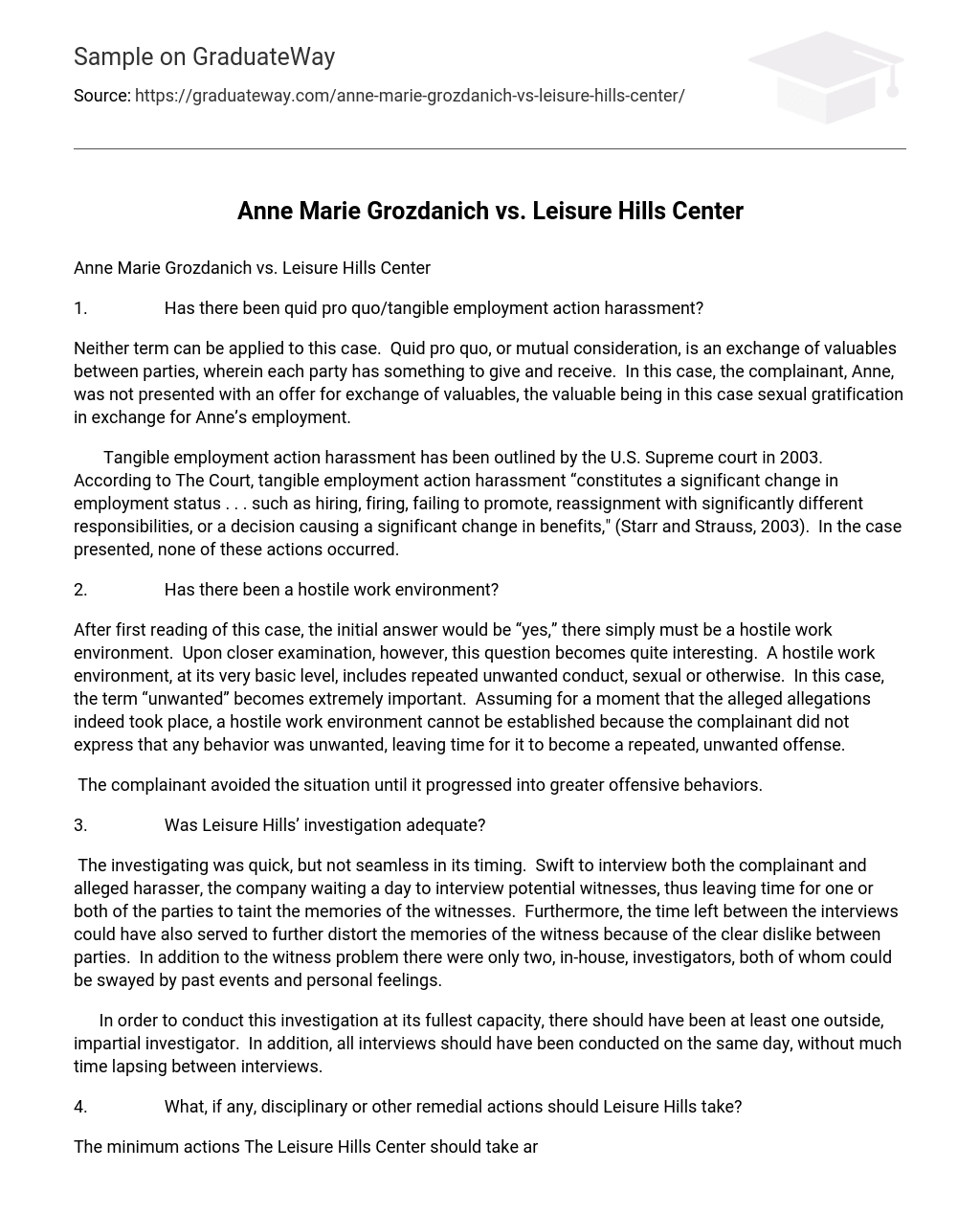1. Has there been quid pro quo/tangible employment action harassment?
Neither term can be applied to this case. Quid pro quo, or mutual consideration, is an exchange of valuables between parties, wherein each party has something to give and receive. In this case, the complainant, Anne, was not presented with an offer for exchange of valuables, the valuable being in this case sexual gratification in exchange for Anne’s employment.
Tangible employment action harassment has been outlined by the U.S. Supreme court in 2003. According to The Court, tangible employment action harassment “constitutes a significant change in employment status . . . such as hiring, firing, failing to promote, reassignment with significantly different responsibilities, or a decision causing a significant change in benefits,” (Starr and Strauss, 2003). In the case presented, none of these actions occurred.
2. Has there been a hostile work environment?
After first reading of this case, the initial answer would be “yes,” there simply must be a hostile work environment. Upon closer examination, however, this question becomes quite interesting. A hostile work environment, at its very basic level, includes repeated unwanted conduct, sexual or otherwise. In this case, the term “unwanted” becomes extremely important. Assuming for a moment that the alleged allegations indeed took place, a hostile work environment cannot be established because the complainant did not express that any behavior was unwanted, leaving time for it to become a repeated, unwanted offense.
The complainant avoided the situation until it progressed into greater offensive behaviors.
3. Was Leisure Hills’ investigation adequate?
The investigating was quick, but not seamless in its timing. Swift to interview both the complainant and alleged harasser, the company waiting a day to interview potential witnesses, thus leaving time for one or both of the parties to taint the memories of the witnesses. Furthermore, the time left between the interviews could have also served to further distort the memories of the witness because of the clear dislike between parties. In addition to the witness problem there were only two, in-house, investigators, both of whom could be swayed by past events and personal feelings.
In order to conduct this investigation at its fullest capacity, there should have been at least one outside, impartial investigator. In addition, all interviews should have been conducted on the same day, without much time lapsing between interviews.
4. What, if any, disciplinary or other remedial actions should Leisure Hills take?
The minimum actions The Leisure Hills Center should take are as follows:
A. Theresa Harding should receive a written warning concerning her disregard for company policy. Harding fully admitted she suggested to the complainant to merely avoid Parson. Harding never suggested to the complainant that she should file a complaint with management, which is company policy.
B. Parsons should be removed from his post and reassigned or terminated. Parsons showed little compassion for the complainant. If his behavior was truly innocent, he would not have reacted defensively or with personal malice toward the complainant. In addition, the act of standing close to the complainant and brushing up against her while trying to adjust equipment is at the very least poor managerial judgment. As a manger, he would have seen this as inappropriate interaction, therefore in has to be determined that is was purposeful. Furthermore, several of his answers were contradictory to his own answers, allowing for one to believe that he was not being truthful. For example, in his testimony of the second incident he stated that the complainant “just stood up after she finished speaking with the family member.” His next comment was to explain that she comforted and walked with the family member, after she stood up, thus insinuating that she had not, in fact, completed her discussion. This action was further corroborated by a Harding, who gave testimony supporting his character.
5. Applying the standard for employer liability, should Leisure Hills be liable for sexual harassment?
Citing Justice Scalia, in reference to Burlington Industries vs. Ellerth, the complaint in the case did not suffer any employment consequences from the harassment, therefore Leisure Hills can not be held responsible for the personal actions of a member of its management, (Lash, 1998).
Is the affirmative defense available?
Parsons seems to be hinting that he wants to pursue affirmative defense because he feels he has been slandered. However, his contradictory statements and demeanor make it difficult for him to get far with counter allegations.
Leisure Hills Center would have no reason to pursue affirmative defense.
Bibliography
Lash, Steve. High court could affect suit by Jones. (1998, April 22). Houston
Chronicle Washington Bureau.
Starr, Michael and Amy L. Strauss. Deconstructing ‘Constructive Discharge.
(2003).Available:http://www.hhlaw.com/articles/843_040419_deconstruci
ng_constructive_discharge.html





